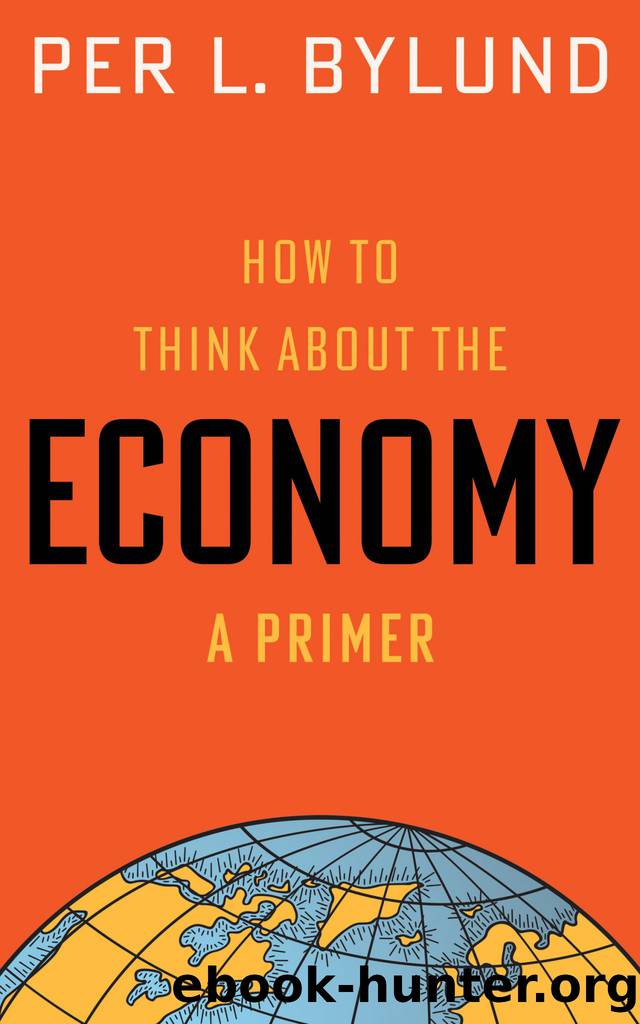How to Think about the Economy by Per L. Bylund

Author:Per L. Bylund [Bylund, Per L.]
Language: eng
Format: epub
ISBN: 978-1-61016-755-0
Publisher: The Mises Institute
Published: 2022-07-15T00:00:00+00:00
THE IMPORTANCE OF MONEY
In a money economy, we use money to pay for goods and can easily compare prices because they are all expressed in the same unitâa currency. But, as weâve seen in previous chapters, prices are really exchange ratios. Money serves as an intermediary that facilitates trade that elevates us above the limitations of barter trade.
The existence of money uncouples peopleâs buying and selling in terms of goods. It makes universal purchasing power of the exchange value of goods. In other words, I can sell my goods or services to one person but use the purchasing power gained in return (as money) to buy goods or services from someone else. This seems obvious because we are used to it. However, the implications are enormous.
Under barter trade, employment would be possible only where an employer can offer the specific goods an employee will accept as payment. Imagine that your employers paid for labor not in money but instead in specific food items: clothing, hygiene products, books, travel, furniture, etc. It is easy to see that finding an employer who offers the most desirable bundle of goods would be almost impossible. It would likely mean that you would need to accept a bundle that is far from perfect to gain employment. You could do much better if you received the exchange value of those goods insteadâthe purchasing power (money)âand used it to buy the goods you prefer.
Money is therefore much more than a convenienceâ it is necessary for exchanges to take place and for the advanced, specialized production processes we take for granted in the modern economy. Large-scale production, supply chains, and specialization are made possible because money uncouples our efforts as both buyers and sellers. Due to the uncoupling, we can also specialize in what we do well rather than produce only what we ourselves want to consume. Consequently, we can focus our production efforts on where we make the biggest differenceâwhere we create most value for society. Without money, we would not be nearly as productive.
The uncoupling also means we can use our acquired purchasing powerâwhat we are paid for producingâ on what we find most valuable. Money makes it possible for us to pursue wants that would never be within reach with barter. The consequence of having and using money means not only greatly improved production but also that we can pursue more valuable consumption. The former facilitates and increases the opportunities for the latter. And the more value we produce, the more purchasing power we are paid in return.
Because all actors in a money economy can pursue those goods they value mostâand can produce those goods that others highly valueâthere is more value overall. We are much better off in a money economy than in a barter economy.
Download
This site does not store any files on its server. We only index and link to content provided by other sites. Please contact the content providers to delete copyright contents if any and email us, we'll remove relevant links or contents immediately.
International Integration of the Brazilian Economy by Elias C. Grivoyannis(109402)
The Radium Girls by Kate Moore(12014)
Turbulence by E. J. Noyes(8040)
Nudge - Improving Decisions about Health, Wealth, and Happiness by Thaler Sunstein(7689)
The Black Swan by Nassim Nicholas Taleb(7105)
Rich Dad Poor Dad by Robert T. Kiyosaki(6603)
Pioneering Portfolio Management by David F. Swensen(6286)
Man-made Catastrophes and Risk Information Concealment by Dmitry Chernov & Didier Sornette(6002)
Zero to One by Peter Thiel(5786)
Secrecy World by Jake Bernstein(4740)
Millionaire: The Philanderer, Gambler, and Duelist Who Invented Modern Finance by Janet Gleeson(4464)
The Age of Surveillance Capitalism by Shoshana Zuboff(4274)
Skin in the Game by Nassim Nicholas Taleb(4235)
The Money Culture by Michael Lewis(4196)
Bullshit Jobs by David Graeber(4179)
Skin in the Game: Hidden Asymmetries in Daily Life by Nassim Nicholas Taleb(3987)
The Dhandho Investor by Mohnish Pabrai(3758)
The Wisdom of Finance by Mihir Desai(3727)
Blockchain Basics by Daniel Drescher(3574)
